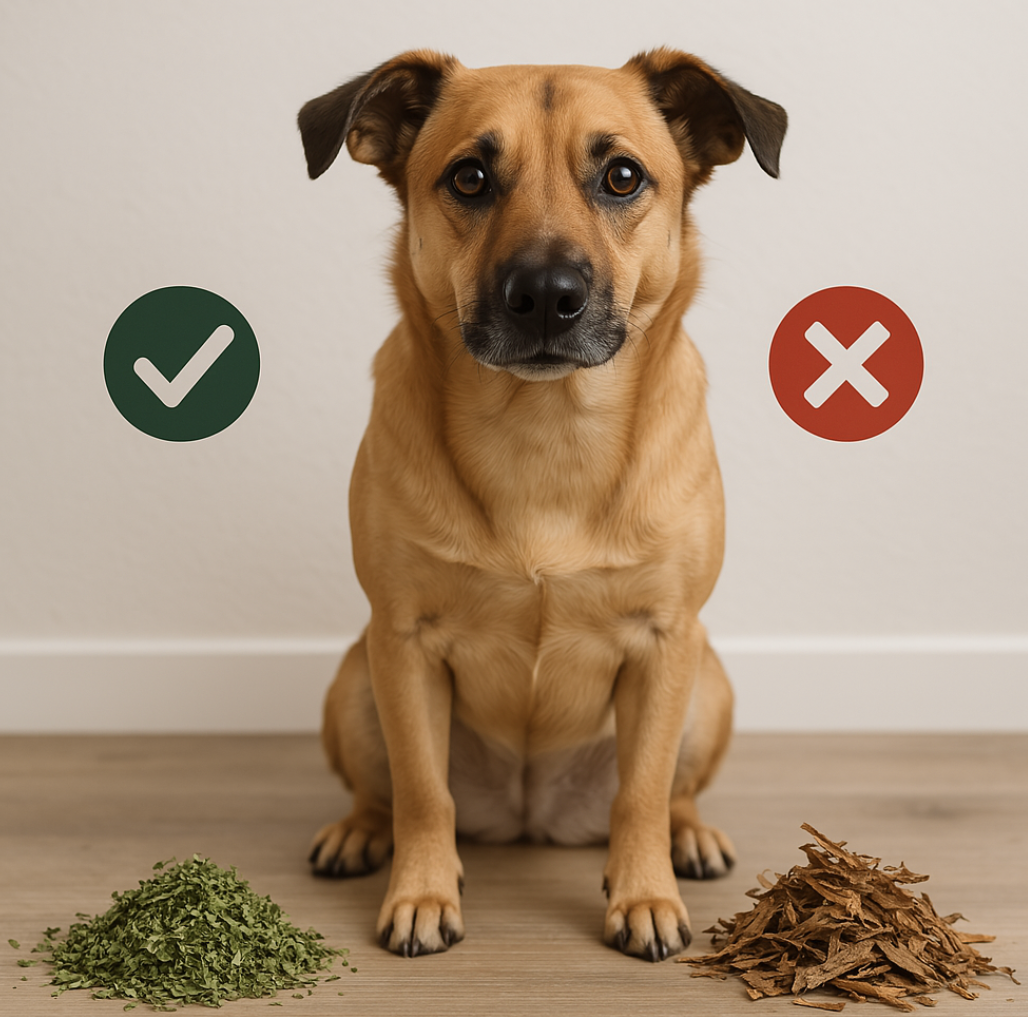Safe Use Of Herbs For Dogs
Herbs have been used for centuries to support health, boost immunity, soothe digestion, calm anxiety, and help the body heal. And yes—dogs can benefit from herbs too! But just because something is natural doesn’t mean it’s automatically safe.
As a holistic pet health coach and herbalist, I want to share the basics of using herbs safely with your dog. Whether you're curious about calming teas, immune support, or gut-friendly greens, here's what you need to know before reaching for that bottle or blend.
Why Herbs?
Herbs can support:
Digestion (like slippery elm or marshmallow root)
Immunity (like echinacea or astragalus)
Calm and focus (like chamomile or skullcap)
Detox and liver support (like milk thistle or dandelion)
Inflammation and pain (like turmeric or ginger)
They can be used as powders, teas, tinctures, or infused into food—but only when used wisely.
The Do’s of Using Herbs for Dogs
Do choose herbs known to be safe for dogs
Not all herbs that benefit humans are safe for pets. Stick to dog-safe herbs and double-check sources. Some herbs are species-specific.Do consider your dog’s age, weight, and health
Puppies, seniors, and dogs with liver, kidney, or digestive issues may need different herbs—or none at all.Do use the right form
Some herbs work best as teas or powders, while others are more effective as tinctures or capsules. And some preparations (like alcohol-based tinctures) need dilution before use.Do introduce herbs gradually
Start slow and watch for changes in stool, behavior, or appetite. Even safe herbs can cause upset if given too much too fast.Do rotate and cycle herbs
Many herbs are best used in short bursts or on a seasonal basis. Long-term use without breaks can sometimes do more harm than good.Do consult a trained herbalist or pet health coach
Especially if your dog is on medications or has chronic issues. Herbs can interact with meds—or offer better support when used correctly.
The Don’ts of Using Herbs for Dogs
Don’t assume human-safe = dog-safe
Garlic, for example, can be beneficial in small, properly prepared amounts—but dangerous if misused. Others like comfrey or pennyroyal can be toxic to dogs.Don’t guess at dosing
Dogs metabolize herbs differently than humans, and “a pinch here and there” isn’t a solid plan. Avoid kitchen-sink mixes without clear guidance.Don’t rely on herbs alone for serious conditions
Herbs support the body but aren’t a magic bullet. Use them as part of a bigger wellness plan that includes nutrition, emotional support, and professional guidance.Don’t buy mystery blends
Choose products with full transparency: no artificial flavors, no unnecessary fillers, and no “proprietary blends” hiding ingredient details.Don’t ignore signs of intolerance
If your dog shows itching, restlessness, digestive changes, or unusual behavior, stop and reassess.
Other Ways to Support Herbal Benefits
Pairing herbs with other natural wellness tools can increase their effectiveness:
Essential oils (in diluted, dog-safe forms) can complement calming or digestive herbs
Homeopathy may be used alongside herbal protocols for deeper support
Massage or Raindrop techniques can enhance circulation and herbal absorption
PEMF or red light therapy can support detox and pain relief
Nutritional changes—like adding fresh food or fermented veggies—help herbs do their job better
Top 5 Things to Do Today
Evaluate your dog’s needs—gut, immune, skin, stress? Start with one focus.
Research one dog-safe herb for that purpose (chamomile, marshmallow root, etc.)
Avoid blends that don’t list exact ingredients or dosing guidance.
Track any changes when introducing a new herb.
Reach out for help—don’t go it alone if you’re unsure.
Dana's Thoughts
Herbs are powerful—but gentle doesn’t mean weak, and natural doesn’t always mean safe. When used thoughtfully, they can be an incredible ally in your dog’s wellness routine. I’ve seen herbs change lives—calming anxiety, clearing up chronic itch, and even helping the body detox after medication.
If you're just starting out, keep it simple and safe. And if you want help creating a seasonal herbal plan tailored to your dog’s needs, let’s connect.
Want even more resources, Q&A, and discussions on nutrition? Join my community forum. Free and Subscription Content.
Statements in this blog have not been evaluated by the FDA. Educational content only. Not intended to diagnose, treat, cure, or prevent any disease.

